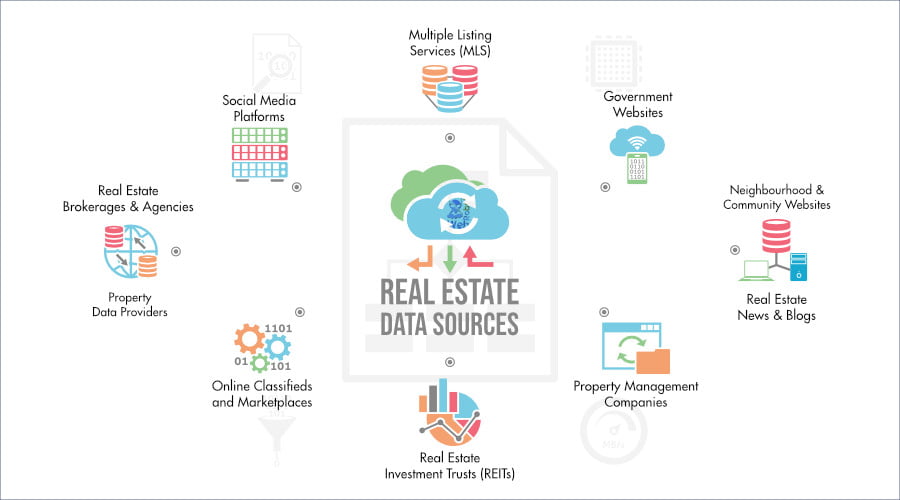
The top benefits, examples, and data sources of real estate web scraping and how agents and brokers can use it profitably for their business.
The real estate industry is ever-evolving. New properties are listed and sold daily, while 41% of real estate buyers look online for properties for sale. Keeping up with this fast-paced market is crucial for professionals in the field, as staying informed about the latest trends and opportunities can significantly impact their success.
One powerful tool that has gained momentum in recent years is web scraping, which allows real estate professionals to extract valuable data from various online sources.
What Is Web Scraping in Real Estate
Web scraping is an automated process of collecting valuable information efficiently and quickly from websites, online forums, news articles, and social media platforms, transforming it into structured data, and organising it for further analysis.
This technique has become increasingly popular in the real estate industry to provide prompt and accurate insights into the market landscape. By harnessing the power of web scraping, industry professionals can gain a competitive edge in areas like market research, property valuation and listing, lead generation, and much more.
Advantages of Real Estate Web Scraping
Web scraping offers numerous advantages to help you gain a competitive edge and drive better results. Let’s see the top seven benefits for brokers and real estate agents.
1. Efficient Data Collection
Web scraping can gather vast amounts of data from multiple online sources quickly and efficiently. This saves you valuable time and resources that would otherwise be spent on manual data collection.
2. Data-driven Decision-making
Access to comprehensive and up-to-date data enables real estate professionals to make more informed decisions regarding property investments, pricing strategies, and marketing efforts. This data-driven approach helps you minimise risk and optimise opportunities in the market.
3. Customised Information
Web scraping allows real estate agents and brokers to collect data specific to their needs and target market. This tailored information is more relevant and valuable, enabling them to focus on the most promising opportunities and streamline their decision-making processes.
4. Enhanced Customer Service
With access to comprehensive data on properties, neighbourhoods, and market trends, real estate agents can provide clients with accurate and up-to-date information. This helps clients make informed decisions and improves the overall customer experience.
5. Real-time Insights
Web scraping enables real estate professionals like you to collect and analyse data instantly. This way, they can have the most current information to respond quickly to market changes and capitalise on emerging trends.
6. Cost-effective
Web scraping can be an affordable solution for data collection in the real estate industry. Its automated process reduces the need for hiring additional staff or investing in expensive data subscriptions.
7. Scalability
Web scraping can be easily scaled to accommodate growing business needs. As the real estate professional’s scope of operations expands, they can increase the volume and variety of data sources to maintain a comprehensive understanding of the market.
Main Uses of Real Estate Web Scraping

1 Market Research
By gathering data on property listings, sales history, and market trends, real estate professionals can identify patterns and gain insights into the current state of the market. This helps them discover when to buy or sell properties and which areas to focus on for investment.
2. Property Valuation
Accurate property valuations are crucial for buyers, sellers, and investors. Web scraping allows real estate professionals to gather data on comparable properties, recent sales, and other relevant factors, which can be used to create more accurate and data-driven valuations.
3. Lead Generation
Real estate agents and brokers can use web scraping to find potential clients by extracting contact information from online sources, such as property owner databases, social media profiles, and local business directories.
4. Competitor Analysis
Web scraping helps you monitor competitors’ listings, pricing, and marketing efforts to adapt your strategies.
5. Neighbourhood Analysis
Web scraping can provide valuable data on local amenities, school ratings, crime rates, and other factors influencing a property’s desirability.
Type of Real Estate Data You Can Scrape
You can use a web scraping service or tool to find, extract, and collect almost any type of data on the Internet. These are the ten most common real estate data you can scrape.
Property Listings
Property listings contain valuable information such as property type, size, location, price, and features. By scraping this data, professionals like you can analyse current market offerings and identify potential opportunities for your clients.
Property Images and Descriptions
Visual content and detailed descriptions attract potential buyers or renters. Scraping this data can help professionals understand how properties are presented in the market and improve their marketing efforts.
Sales Data
Information on past property sales, including transaction prices and dates, can be valuable for market trends analysis and making informed decisions on property valuation and investments.
Property Tax Records
By scraping property tax records, buyers, sellers, and investors can get insights into the tax history and assessed value of properties.
Rental Rates
Gathering data on rental rates in specific areas helps real estate professionals understand the rental market and advise clients on potential investment opportunities.
Neighbourhood Data
Information on local amenities, schools, crime rates, and other neighbourhood factors can significantly impact a property’s desirability. Scraping this data allows you to provide your clients with a comprehensive understanding of the area surrounding a property.
Demographics
Data on population, income levels, and age distribution can help real estate professionals identify target markets and tailor their marketing strategies accordingly.
Mortgage Rates
Scraping mortgage rate data from banks and other financial institutions can help professionals advise clients on financing options and support their decision-making process.
Competitor Data
They can include your competitors’ listings, pricing strategies, and marketing efforts.
User Reviews and Testimonials
Client reviews and testimonials can provide valuable insights into customer satisfaction and areas for improvement. Scraping this data can help real estate professionals enhance their services and reputation.
Valuable Websites and Data Sources for Real Estate

Web scraping can help your real estate business successfully. But you must know where to gather valuable data. Here’s a list of web data sources with names and examples.
- Multiple Listing Services (MLS): These databases contain comprehensive information on property listings in a specific region, including property type, size, location, price, and features. Examples of MLS databases include Zillow, Realtor.com, Redfin, and Trulia.
- Real Estate Brokerages and Agencies: Websites of local real estate brokerages and agencies can provide valuable data on property listings, pricing strategies, and marketing efforts.
- Government Websites: Local, state, and federal government websites often contain data on property tax records, zoning regulations, and other relevant information. Examples include county tax assessor websites and the U.S. Census Bureau.
- Property Management Companies: Websites of property management companies can offer insights into rental rates, property maintenance, and tenant demographics.
- Real Estate News and Blogs: Websites dedicated to real estate news, such as Inman, Curbed, and HousingWire, can provide valuable information on market trends, industry news, and expert opinions.
- Real Estate Investment Trusts (REITs): Websites of REITs can offer insights into commercial and residential property investments and market trends.
- Online Classifieds and Marketplaces: Websites like Craigslist, Zumper, and HotPads can provide data on property listings, rental rates, and local market trends.
- Social Media Platforms: Websites such as Facebook, Twitter, and LinkedIn can offer valuable information on real estate agents, property listings, and user-generated content related to the industry.
- Neighbourhood and Community Websites: Local community websites, forums, and neighbourhood associations can provide insights into nearby amenities, events, and other factors that impact a property’s desirability.
- Property Data Providers: Websites that provide access to property data, such as DataTree, CoreLogic, and ATTOM Data Solutions, can offer a wealth of information on property characteristics, sales history, and other relevant data points.
Real Estate Web Scraping Real-Life Examples
Web scraping has been increasingly adopted by the real estate industry, with various real-life examples illustrating its impact on different aspects of the business. Here, we’ll explore several real-life examples of how web scraping has been successfully used to drive success in the real estate industry.
Real Estate Investment Analysis
A real estate investment firm wanted to identify profitable investment opportunities in the residential market. They used web scraping to gather data on property listings, historical sales, rental rates, and neighbourhood demographics from multiple online sources. By analysing this data, the firm was able to identify emerging trends, pinpoint areas with high growth potential, and make well-informed investment decisions. This data-driven approach helped them maximise their returns on investment and stay ahead of the competition.
Property Valuation and Appraisal
A property appraisal company needed accurate and up-to-date data to assess the value of residential and commercial properties. They employed web scraping to collect data on comparable properties, recent sales, property tax records, and local market conditions. Using this information, the company created more accurate property valuations, benefiting buyers and sellers in the negotiation process.
Lead Generation for Real Estate Agents
A real estate agent wanted to grow their client base by targeting property owners looking to sell their homes. They used web scraping to gather contact information from online property owner databases and social media platforms. By segmenting and analysing this data, the agent was able to identify potential clients and tailor their marketing efforts to reach the right audience. This targeted approach resulted in more clients and a higher conversion rate.
Competitor Analysis and Benchmarking
A real estate brokerage gained a competitive advantage by understanding the strategies of its competitors. The company used web scraping to collect data on competitors’ listings, property prices, and marketing activities. Upon data analysis, the brokerage could identify areas of improvement to adapt its approach to stay ahead in the market.
Neighbourhood Analysis for Homebuyers
Real estate agents used web scraping to collect data on local amenities, school ratings, crime rates, and other influencing factors. This information was then used to create detailed neighbourhood profiles, allowing the agents to serve their clients better and improve their overall customer experience.
Best Ways to Visualise Real Estate Data
You have collected all the necessary data for your real estate business. But now what? How can you concretely see the outcome? There are several techniques to represent real estate data, each with its benefits and use cases.
Data Scraping Methods to Extract Real Estate Data
Data scraping methods to extract real estate data from various websites and online sources range from simple manual extraction to more advanced automated techniques. Here are some of the most commonly used data scraping techniques for extracting real estate data.
1. Manual Data Extraction
This method involves manually visiting websites, copying the relevant data, and pasting it into spreadsheets or databases. While this approach can work for small-scale data collection tasks, it is time-consuming, prone to human error, and not feasible for large-scale data extraction.
2. Browser Extensions
There are several browser extensions, such as Web Scraper, Data Miner, and ParseHub, that can be used to extract real estate data from websites. These extensions can simplify the data extraction process, allowing users to select the specific data they want to collect and export it in a structured format.
3. Web Scraping Libraries and Frameworks
Many programming languages, such as Python, offer libraries and frameworks specifically designed for web scraping (i.e. Beautiful Soup, Scrapy, and Selenium). These tools allow developers to create custom web scraping scripts that automatically navigate websites, extract the desired data, and store it in a structured format.
3. Real Estate Web Scraping Tools and APIs
They provide ready-to-use tools for extracting real estate data from websites. These apps often offer user-friendly interfaces, and some provide advanced features like handling JavaScript rendering, handling CAPTCHAs, and managing proxies to avoid IP blocking.
4. Custom Real Estate Web Scraping Solutions
For more complex or niche real estate data extraction needs, custom web scraping solutions can be developed by in-house teams or outsourced to web scraping specialists. These custom solutions can be tailored to meet specific requirements. They can include advanced features like handling dynamic websites, managing large-scale data extraction, and integrating the scraped data into existing business workflows.
Each data scraping method has its advantages and limitations, and the choice of method depends on factors such as the scale of data extraction, the complexity of the target websites, and the specific data requirements.
The real estate market is diverse and complex. If you want to stand out, cope with the industry challenges and turn the threats and downs into success factors, a data-driven business approach is becoming a must-do. Therefore, data web scraping is a train you can’t afford to miss. The alternative is falling behind with what’s left.
Don’t miss out on the benefits web scraping can bring to your real estate business. Start harnessing the power of web scraping today to stay ahead in this competitive industry and drive growth for your business.
Make you real-estate business competitive
Extract valuable properties and house data with our no-code web scraping tool.
Disclaimer: Always respect user privacy and copyright, follow ethical data scraping practices, and abide by the terms and conditions of the websites or platforms you’re scraping data from, as unauthorised data extraction may lead to legal or privacy issues. Therefore, ensure that your data collection and analysis methods are compliant. Furthermore, this data can be noisy, unstructured, and constantly changing. Therefore, use a tool or service that can handle the volume and variety of data from multiple web sources.


















[…] example, scraping real estate listings or property databases can provide insights into housing market trends. This is essential when you […]